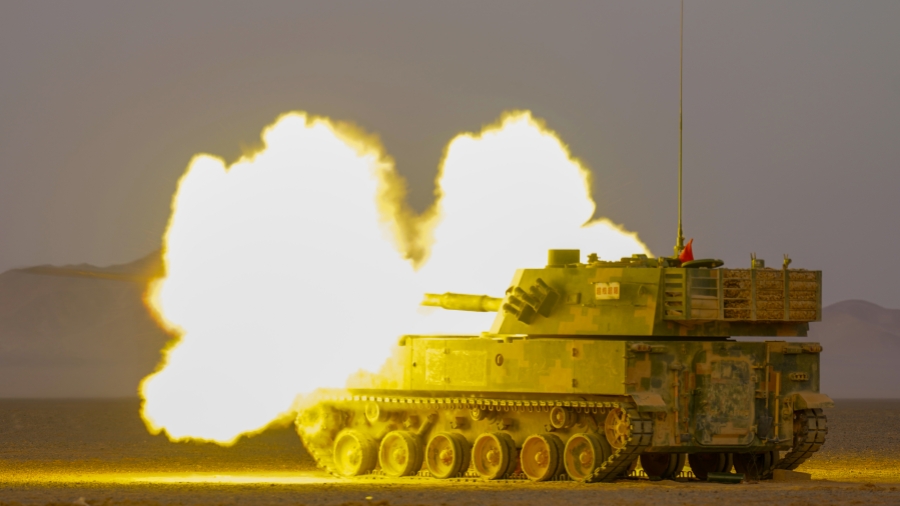By Zhang Chi
The 21st Shangri-La Dialogue brought together defense officials from various countries to deliberate on security concerns in the Asia-Pacific region and beyond. The Chinese side dispatched a high-level delegation, headed by its defense minister, to actively engage in the dialogue, aiming to make constructive contributions towards peace and development in the Asia-Pacific.
In today's world, peace and development stand out as the paramount global public goods in the context of accelerating changes unseen in a century and increasingly complex game between major powers. Facts prove that China plays an active role as a guardian of peace and development in both the Asia-Pacific region and the world at large. Implementing the China-proposed Global Security Initiative (GSI) is deemed essential for safeguarding peace and fostering development in the Asia-Pacific region.
Over the past four decades, the Asia-Pacific has indeed established itself as one of the world's most peaceful and stable regions, experiencing unparalleled economic and social advancement. This remarkable progress can be attributed significantly to the steadfast commitment of most Asian nations to managing their international interactions based on principles of openness, inclusiveness, mutual respect, mutual benefit, and peaceful coexistence.
The world is currently navigating through a turbulent period marked by a sluggish global economy, recurrent local conflicts, and mounting global challenges. Against this backdrop, the Asia-Pacific region faces new obstacles in its quest for peace and development, notably the emergence of certain cliques that have exacerbated disparities and disagreements among regional nations. As a major player in the region, the US, ostensibly holding high the banner of "freedom and openness", is actually clinging to the outdated Cold War mentality.
In East Asia, the US deliberately inflames sensitive issues like the cross-Strait relations and South China Sea dispute, trying to cobble together exclusive "small circles" through military cooperation, exemplified by the Quad, comprising the US, Japan, India, and Australia, as well as the AUKUS, a trilateral security partnership involving the US, the UK, and Australia. Recently, the US has instigated and supported the Philippines' infringement and provocation, thereby severely undermining the regional cooperation framework. Moreover, the Indo-Pacific Economic Framework vigorously championed by the US not only excludes China, but also deliberately includes seven out of ten ASEAN countries and excludes the other three, which clearly shows its attempt to undermine the ASEAN's unity. It is believed that the fundamental intention of the US is to fuel bloc rivalry, escalate regional tensions, induce, and coerce regional countries to take sides, with the ultimate attempt to construct an encirclement strategy aimed at containing China. In the Middle East, the US has consistently exercised its veto power in the UN Security Council to block resolution drafts regarding the situation in Palestine, which has drawn criticism from various quarters within the international community.
Facing the growing turmoil in the world, it is all the more crucial to implement the GSI and steadfastly safeguard the hard-won peace and development. In recent years, China has elaborated on the concept of building a community with a shared future for mankind, proposing and implementing initiatives such as the Global Development Initiative, the GSI, and the Global Civilization Initiative, all aimed at fostering a better world. Among these, the GSI advocates a new path to security featuring dialogue over confrontation, partnership over alliance, and win-win cooperation over zero-sum, offering China's solution to addressing international security dilemmas. This initiative, which has been recognized by over 100 countries and international organizations worldwide, provides practical solutions for conflict and risk resolution. Whether it is facilitating reconciliation efforts in Syria or promoting solutions to crises like the Ukraine crisis and the Palestinian-Israeli conflict, China, through its active implementation of the GSI, has been contributing its wisdom and strength to regional and global peace.
Furthermore, China staunchly supports ASEAN's central role in regional cooperation and opposes taking sides, bloc confrontation, and a new Cold War. China advocates for resolving differences and disputes among countries through peaceful means, demonstrating its responsible role as a major country. Over the past 20 years since the signing of the Declaration on the Conduct of Parties in the South China Sea (DOC), China and the ten ASEAN member states have gradually sought out effective approaches to enhance mutual trust and manage differences within the "10+1" framework, accumulated successful experience in dialogue and cooperation, and maintained overall peace and stability in the South China Sea.
In recent decades, China-ASEAN cooperation has made remarkable strides, establishing itself as one of the most successful and dynamic models of Asia-Pacific cooperation and a vivid example of promoting the building of a community with a shared future for mankind. As China embarks on a new era of development and ASEAN progresses into a new phase of growth, China will, as always, stick to neighborhood diplomacy and give priority to ASEAN in its foreign relations. China is ready to cooperate with ASEAN countries to uphold the international system with the UN at its core, expand pragmatic cooperation, and jointly safeguard regional peace and development.
(The author is from the National Security College, PLA National Defense University.)









